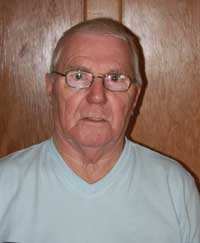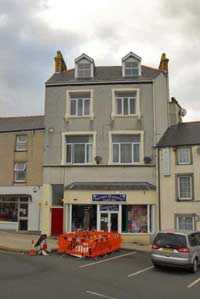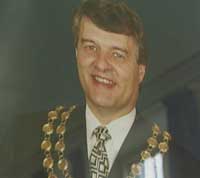 ONE OF Anglesey’s big political beasts steps down next month after more than two decades of political influence on the island.
ONE OF Anglesey’s big political beasts steps down next month after more than two decades of political influence on the island.
On paper Gareth Winston Roberts’ record looks impressive. He was twice Leader of the county council — from 2005 to 2008 and, earlier, from 1996 to 1998. He was awarded the OBE in 1998 for services to employment on the island.
But he’s been the subject of a police investigation into allegations of misconduct. He was forced to resign in 1998 after a government watchdog damned his administration and a high-profile planning scandal ended with the defeat of his ruling coalition in the 2008 elections.
The story of the millionaire councillor’s rise to power and wealth has never been fully told.
It makes shameful reading …

GARETH WINSTON ROBERTS, OBE
Awarded an OBE in 1998, he was not able to collect it until 2002. A series of police investigations into his conduct during the late 1990s delayed the ceremony.
THE FOUNDATIONS of Gareth Winston Roberts’ million pound property empire were laid in a series of breath-taking deals in the early 1990s.
He and his political allies drove a coach and horses through the planning system to lay the groundwork of his prosperity.
His family now own at least eight properties in the old Anglesey seaport of Amlwch which he and his friends control.
In the process a man’s life was brutally destroyed.
The failure of the entire political system in Wales to stop the tragedy left Roberts and his cronies with a sense of invincibility that still casts a long shadow over island politics.
Roberts, who started his working life at the Wylfa nuclear power-station, had been a councillor ever since the 1970s.
Throughout the 1980s his influence was growing and by the end of the decade he was ready to strike.
The first act of the drama began in September 1990 when he applied for planning permission to build a house and stables on a plot of agricultural land he’d bought in the village of Burwen just outside Amlwch.
It was his turn to reap one of the key rewards of politics on the island — a valuable planning permission. A previous attempt to build on the land, in 1973, had failed.
The plot was close to the Area of Outstanding Natural Beauty and was not included in the island’s structure plan of places where new building was allowed.
It was therefore a “departure” application.
Planners noted that the application did not conform to the council’s structure plan and that there were 74 houses for sale in the area. “Recommendation should be refusal regardless of any local need,” was the conclusion.
A television report also noted that there were 56 plots in the area with planning permission which were up for sale.
Roberts argued that his application should be allowed because, as a local councillor, he needed to live in the ward he represented.
Some local residents objected strongly.
One wrote to the planners claiming that the application “is causing considerable criticism and is widely talked about, especially as it is against the Structure Plan and also the wishes of the Planning Officers who gave very valid reasons that consent should not be given.”
“Not only is Councillor Winston Roberts not a resident of Amlwch, he is on the register in his own home in Clynnog [Caernarfon] area … Furthermore, if Councillor Roberts is so keen to live in Amlwch, there are plenty of empty properties available and he may even own some.”
♦♦♦
FOR THIS article — and more than two decades after he applied for the planning permission — Rebecca checked these allegations.
The current county council couldn’t find Gareth Winston Roberts’ declarations of interest for the period when he was a borough councillor in the early 1990s.
Even so, we discovered that he and his wife bought a property called Pen Y Bryn at Clynnog on the main road from Caernarfon to Porthmadog in 1982.
They were listed there on the electoral registers for 1989, 1990 and 1991.
Roberts also owned another property on the Welsh mainland.
We discovered that he also owned property in Amlwch. In September 1989, a year before he applied for planning permission for the Burwen, he and his wife bought a flat in the centre of Amlwch.
The planning application for his new home was approved. The committee gave as its reason the fact “that the applicant is not seeking to sell but the right to build a house for himself and his family” and he is “living in a rented house … at the moment.”

ERWAU’R GWYNT
The substantial house Roberts build on the outskirts of Amlwch. Close to the sea, the controversial planning permission added more than £100,000 in today’s prices to the value of the site before a brick was laid. Picture: Barry Davies
So, even though he stated that he was living in rented accommodation at the time of the application, he and his wife were the owners of three other properties.
One of them was a farmhouse they had owned since 1982.
The Council for the Protection of Rural Wales wrote to the council to say that the reasons were not valid planning reasons and pointed out that “a similar application on virtually the same site was refused in 1973.”
There were also fears that the proposed stables on the site would soon turn into another, separate property within a couple of years.
Roberts’ lawyer was Amlwch solicitor Myrddin Owens, a former Ynys Môn Borough Council employee who also served a term as an elected representative. He was, for a time, chairman of the housing committee.
Owens wrote to the planners: “We have now spoken to our client at some length … he is prepared to enter into an agreement with the council not to apply for any more development on the site.”
He added: “Our client would also wish the committee to be aware that he has been employed and has lived in the area for more than 20 years and that he currently resides in rented accommodation …”
The permission was passed in March 1991. The then Leader of the council, W J Williams, defended the decision: “I don’t think, as far as I’m concerned, as far as members of the planning committee are concerned, that we have dealt with councillors differently to any other applicant.”
However, planning applications like Councillor Roberts’ were causing concern.
Campaigner Tony Nixon attended every planning meeting for four years and sent a report to the Welsh Office.
His analysis revealed 60 cases where councillors had rejected the advice of planners as well as their own structure plan — and approved applications.
♦♦♦
HAVING SECURED the valuable planning permission — worth between £100,000-£150,000 at today’s prices — Councillor Roberts then moved on to lay the foundations of his property empire in Amlwch.
He was one of three men who made a killing by buying a failed hotel in the centre of Amlwch, obtaining planning permission to turn it into flats and then persuading the council’s housing department to award them a huge grant to carry out the conversion.
But, while this was going on, a local businessman who was trying to do exactly the same thing with another hotel, was utterly ruined.
The Grenville Affair became even more notorious than Roberts’ planning permission.
In 1987 Bill Farrell, a haulage contractor, had bought the Dinorben Arms – a hotel in the town centre. The price was £185,000 and he obtained a mortgage from a brewery.

BILL FARRELL
To save himself from bankruptcy, he needed permission to convert part of a hotel he owned into flats. Officials thought it was a good idea but the planning committee turned it down.
The purchase of the hotel was handled by the Amlwch solicitor, Myrddin Owens. He was also the solicitor who had acted for Gareth Winston Roberts over his planning application.
The Dinorben Arms was a major landmark in Amlwch town centre. The front section was a listed building but a modern extension had been built at the back.
The flat roof on the extension needed replacing but the night after contractors began work, there was a major fire that destroyed part of the roof and six bedrooms.
“So that was a good start to a new venture,” said Farrell. “Two weeks later Shirley, my wife, had a stroke and died very suddenly.”
To try to stimulate business, Farrell started running discos. They were profitable but there were problems when customers left the pub and caused trouble in the town centre.
Farrell tried to introduce a members-only system to try to control the situation. But he then received a visit from then Chief Inspector Clive McGregor (later leader of the council between 2009-2011).
Farrell says that McGregor told him that the membership scheme was unacceptable and that unless he surrendered his entertainment licence, the police would oppose his liquor licence.
Farrell gave up the entertainment licence and turnover fell sharply.
At the time there was a recession. Bill Farrell tried to sell the hotel but couldn’t find a buyer.
HM Customs and Excise was granted a winding up order against Farrell and he lost the family home as well as another pub in Amwlch, the Queens Head.
HM Customs and Excise didn’t take possession of the Dinorben Arms — giving Farrell the chance to obtain planning permission to convert the modern extension at the back of the hotel into eight flats.
“Everyone was aware that if I didn’t get planning permission we were going to go bust,” he says, “which is exactly what happened.”
A council official examined the proposals in December 1990 and recommended approval.
“There is considerable demand for single person accommodation which the council is unable to cater for because of a shortage of local authority flats.”
He added that some hotels in Amlwch were being used to put up these people “but good quality flats are far better to meet the needs of single persons than bed and breakfast or houses in multiple occupation.”
“In this respect, these proposals for the Dinorben may be useful for accommodating an urgent housing need.”
He noted that some of the proposed flats were on the small side and that proper fire escapes were essential but concluded: “I see no grounds for objection.”
But when the scheme came before the planning committee, it was twice rejected.
It was refused on the grounds that it would overload the sewers — despite three letters from the National Rivers Authority each stating separately and categorically that in their opinion the conversion would mean a considerable reduction on the load into the sewers.
The committee also cited the fact that the development would have a detrimental effect on the front part of the building which was listed. However, Farrell’s plans only affected the modern extension at the rear.

DINORBEN ARMS HOTEL
Bill Farrell wanted to turn a modern extension at the rear into flats. Anglesey’s planning committee turned him down for reasons that were demonstrably false. Picture: Barry Davies
With the refusal, HM Customs and Excise also took possession of the Dinorben Arms.
Bill Farrell was forced to live in a rented caravan: all he was allowed to keep was a single van to carry on a small part of his haulage business.
A stone’s throw from the Dinorben Arms is what used to be the Grenville Hotel.
It had been repossessed and in 1991 it was bought for £55,000 by a consortium of local people including local Councillor Gareth Winston Roberts.
The other members were Roberts’ solicitor Myrddin Owens and Peter Egan, a solicitor in the same Amlwch law practice as Owens.
Six months after Bill Farrell’s plans were turned down, the council approved a scheme to convert the Grenville Hotel … into eight flats.
Unlike the Dinorben, councillors didn’t feel the need to bring the application before the planning committee. The matter was dealt with by officers under delegated powers.
Their approval was quick— just over a fortnight — compared with the months Bill Farrell had to wait before his refusal.
Farrell was stunned.
“What could I do, you know? It wasn’t just me that felt something had gone very badly wrong – a lot of local people were quite inflamed, incensed at the idea that these people had come along and done exactly what I’d wanted to do and wasn’t allowed to do …”
Gareth Winston Roberts, who was a member of the planning committee, had supported Bill Farrell’s application to convert the Grenville Arms.
In the council files on the Dinorben Arms and the Grenville Hotel there are two extraordinary memos written in 1992 by Arthur Owen, the council’s Director of Planning.
In the first he stated bluntly: “ I cannot … give what could be considered a satisfactory planning reason for approving one proposal and refusing the other.”
In another he noted: “In my opinion the Council was fortunate that the Ombudsman did not investigate the matter as, from a planning point of view, there was no valid reason to refuse permission on the Dinorben Arms Hotel.”
Rebecca asked the current Ombudsman for Wales office why there was no investigation into the affair. A spokesperson told us they did not keep files going back that far.
♦♦♦
THE GRENVILLE went from strength to strength. Soon after it was given planning permission, it was awarded a council grant that covered almost all of the estimated cost of renovating the building.
The grant was £220,000 — just £30,000 short of the sum Councillor Roberts claimed he and his partners needed to convert the hotel.
The formula for working out what an applicant should receive was simple. It was calculated by working out the income before the conversion and comparing it with the rent afterwards.
If the rent was higher afterwards, which is normally the case, the amount of grant is reduced. If it is lower, which is unusual, then the grant is higher.
The grant for the Grenville was high because the projected rent for the eight new flats was much lower than the income allegedly generated by the building when it was a working hotel.

GRENVILLE HOTEL
Gareth Winston Roberts and his partners had no trouble getting planning permission — and soon had an enormous grant to convert it into flats. Picture: Barry Davies
Agents acting for Councillor Roberts and the two solicitors claimed that the Grenville Hotel’s annual income before the renovation was nearly £82,000.
This was based on 28 beds being occupied for three-quarters of the year at a weekly rate of £75. The projected income from the shop and the eight flats was far less.
This entitled the applicants to a grant of £220,000.
However, the current affairs television programme Wales This Week did some investigating in 1993.
A researcher went back to Valerie Kelly, one of the original owners of the Grenville, and asked her about the occupancy rates.
She told the programme that the average number of paying customers was nine guests paying £55 a week — giving a maximum annual income of £26,000.
This was less than a third of the figure the applicants had declared.
But the grant was approved by the Ynys Môn housing and property department. The director was John Arthur Jones.
Bill Farrell was staggered by the size of the grant.
“These people have had a grant of £220,000 on a scheme that was costing £250,000 and there again my flats was going to cost £42,000 for eight flats. Maybe I was being a bit extra efficient because I was paying for it myself.”
The Grenville was one of the foundations of Gareth Winston Roberts’ property portfolio in Amlwch, today worth more than a million pounds.
In 1992 the Dinorben Arms was purchased from the receivers by a consortium comprising Gareth Winston Roberts, Myrddin Owens and Peter Egan.
The price was just £80,000 compared with the £185,000 Bill Farrell paid in 1987.
Bill Farrell’s humiliation was complete.
The Dinorben-Grenville affair caused a scandal in Anglesey at the time. Complaints was made to the District Auditor, the Welsh Office, the Ombudsman — and the North Wales Police.
Nothing happened to correct the injustice done to Bill Farrell.
One ratepayer wrote to the council asking them to investigate. “Here is a classic case of the council badly treating one applicant,” he told chief executive Leon Gibson, “most probably on a thumbs down from the local member, yet granting consent to one of his direct competitors, a company in which the local member has an interest.”
He added: “This is just the sort of dirty double-dealing that we have been complaining about for years. Is it not time that something was done about it?”
Gibson asked the Director of Planning, Arthur Owen, to look into this complaint. Arthur Owen wrote a report which the council told us has now been lost.
But in the planning file there is a memo from Owen to the chief executive.
“From a planning point of view,” Owen wrote, “the matter has already been considered by the Ombudsman and a complaint sent to the Welsh Office.”
“The Ombudsman did not wish to investigate and the Secretary of State did not call in the application.”
But he added: “the council was fortunate that the Ombudsman did not investigate the matter as, from a planning point of view, there was no valid reason to refuse permission on the Dinorben Arms Hotel.”
In 1993 the borough council’s chief executive Leon Gibson said that the District Auditor had investigated the grant awarded to the Grenville Hotel in November and early December 1992.
He told the Wales This Week television programme in 1993 that the District Auditor “was satisfied that the … grant application had been properly dealt with in accordance with current legislation.”
♦♦♦
IN 2008 the Grenville was sold for just £210,000.
In the early 1990s Gareth Winston Roberts and his partners had bought the property for £55,000 and the council had given them a £220,000 grant.

GARETH WINSTON ROBERTS
Although he is not standing in the May local elections, he has already been elected unopposed for a seat on Amlwch Town Council. Also elected, unopposed, was solicitor Myrddin Owens.
On paper, at that time, it should have been worth £275,000.
In the period between the purchase of the hotel and its sale in 2008, house prices in the UK rose by 320 per cent. The Grenville should have been worth anything up to £885,000.
The decline in value is a colossal £610,000.
Amlwch is a depressed area and house prices didn’t increase in line with the national average.
Even so, somewhere between a quarter and half a million pounds in public funds, at todays prices, appears to have vanished into thin air.
We asked Gareth Winston Roberts and his partners Myrddin Owens and Peter Egan to explain the discrepancy.
Roberts had not replied by the time this article was published.
However, in 1993 he said: “ … in-depth investigations, which lasted around 18 months, were conducted by a number of organisations, and none found any evidence of impropriety in relation to my business affairs.”
No reply had been received from Myrddin Owens and Peter Egan by the time we went to press.
Today, Bill Farrell has remarried and lives in Rhosgoch, a few miles from Amlwch.
He continued as a small-scale haulage contractor until he retired.
He now says of Gareth Winston Roberts: “Whenever I see that man, my flesh crawls.”
♦♦♦
© Rebecca 2013
CORRECTIONS Please let us know if there are any mistakes in this article — they’ll be corrected as soon as possible.
RIGHT OF REPLY If you have been mentioned in this article and disagree with it, please let us have your comments. Provided your response is not defamatory we’ll add it to the article.
DONATIONS If you would like to support the work of Rebecca, you can do so by clicking on the DONATE button.
COMING UP
WE CONTINUE the extraordinary story of the political life and times of John Arthur Jones who’s trying to regain a seat on the council in May. In the article The Gospel According To “Jesus” Arthur Jones Rebecca reveals the astonishing self-belief of a man who likened himself to Christ when he was sacked by the council. During a televised confrontation with a journalist, he tried to sabotage the exchange by accusing him of being a paedophile. And we have obtained an extraordinary statement he made which bears testament to the way officials and politicians really ran Anglesey.

